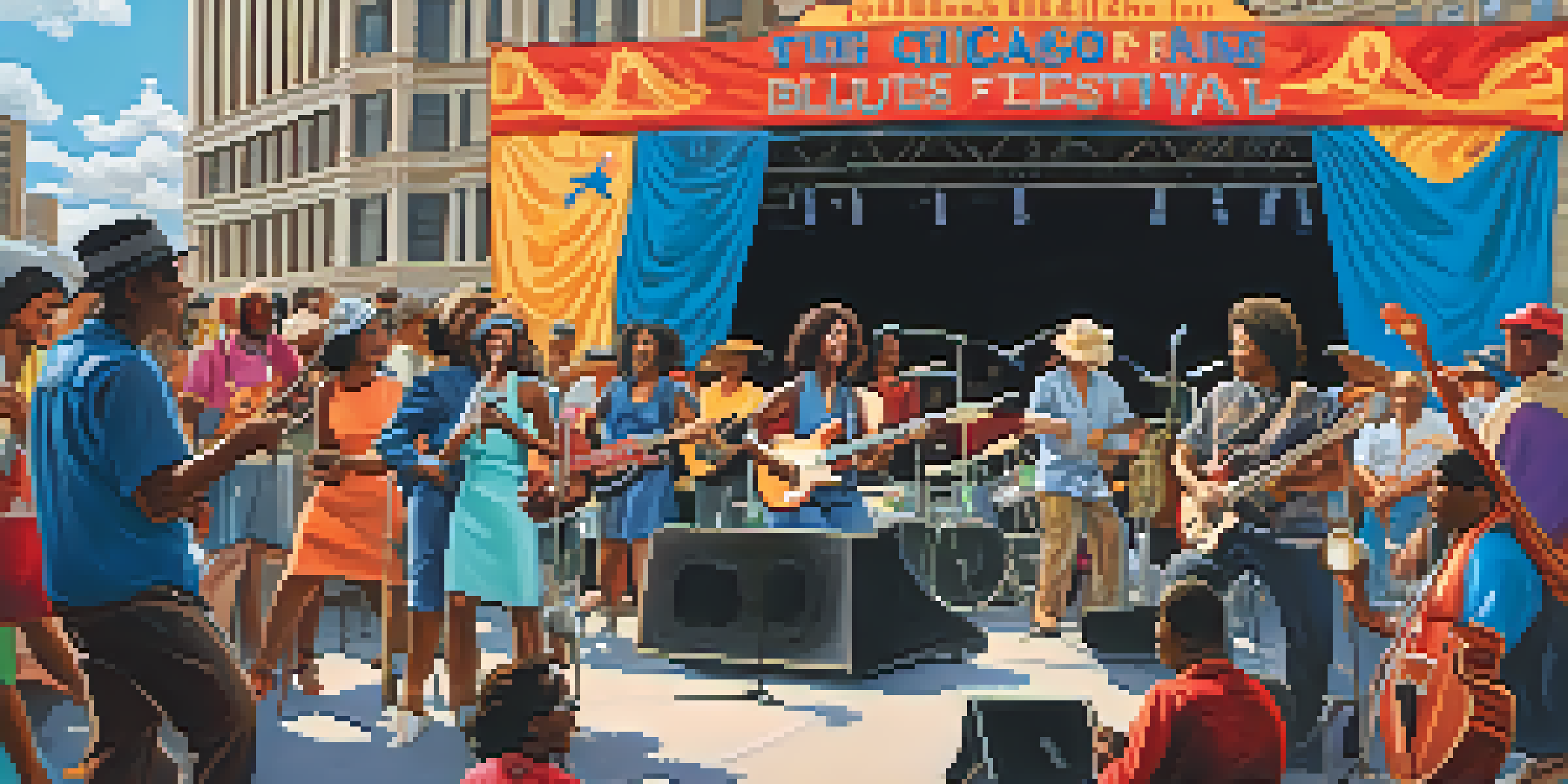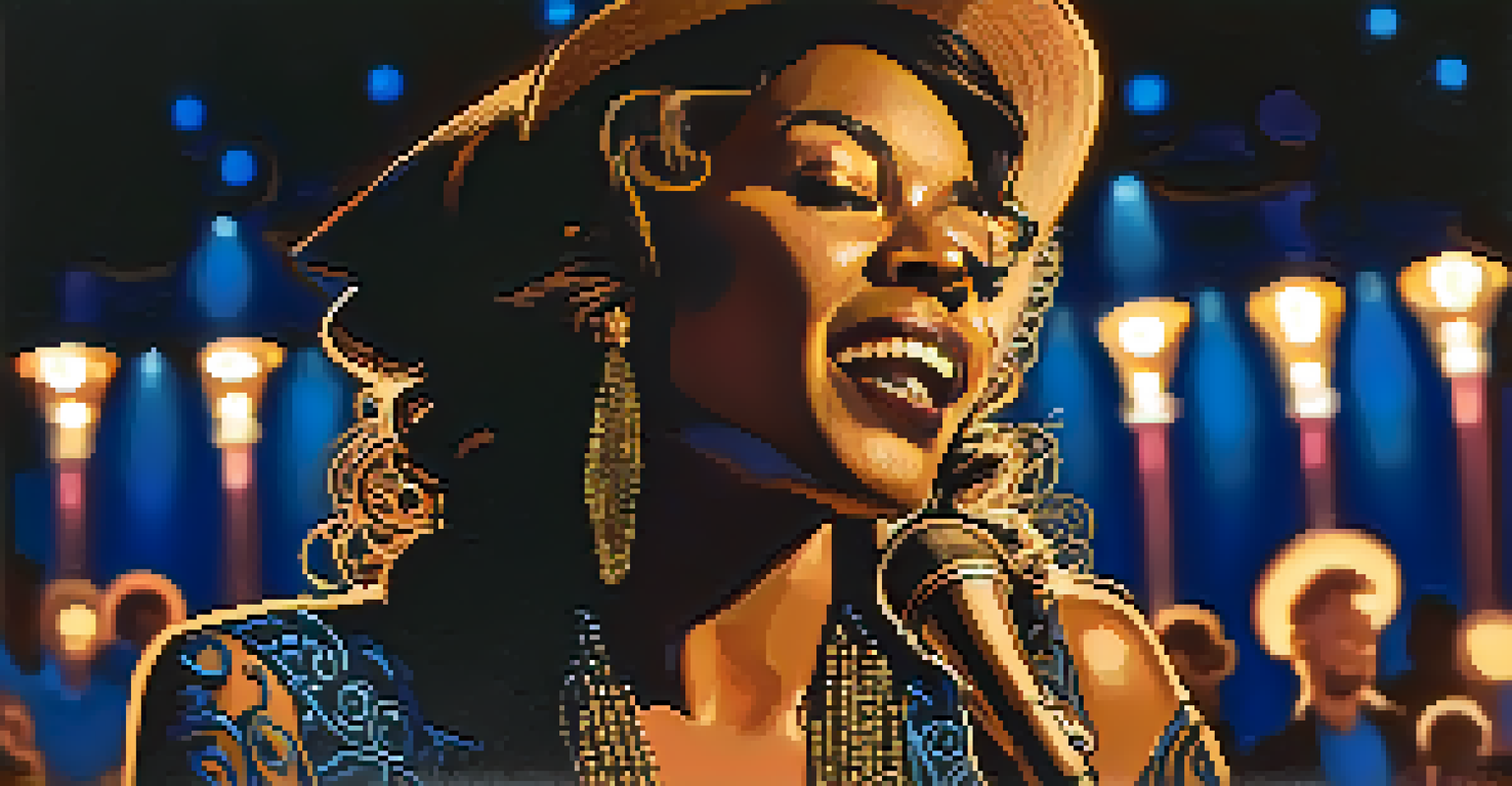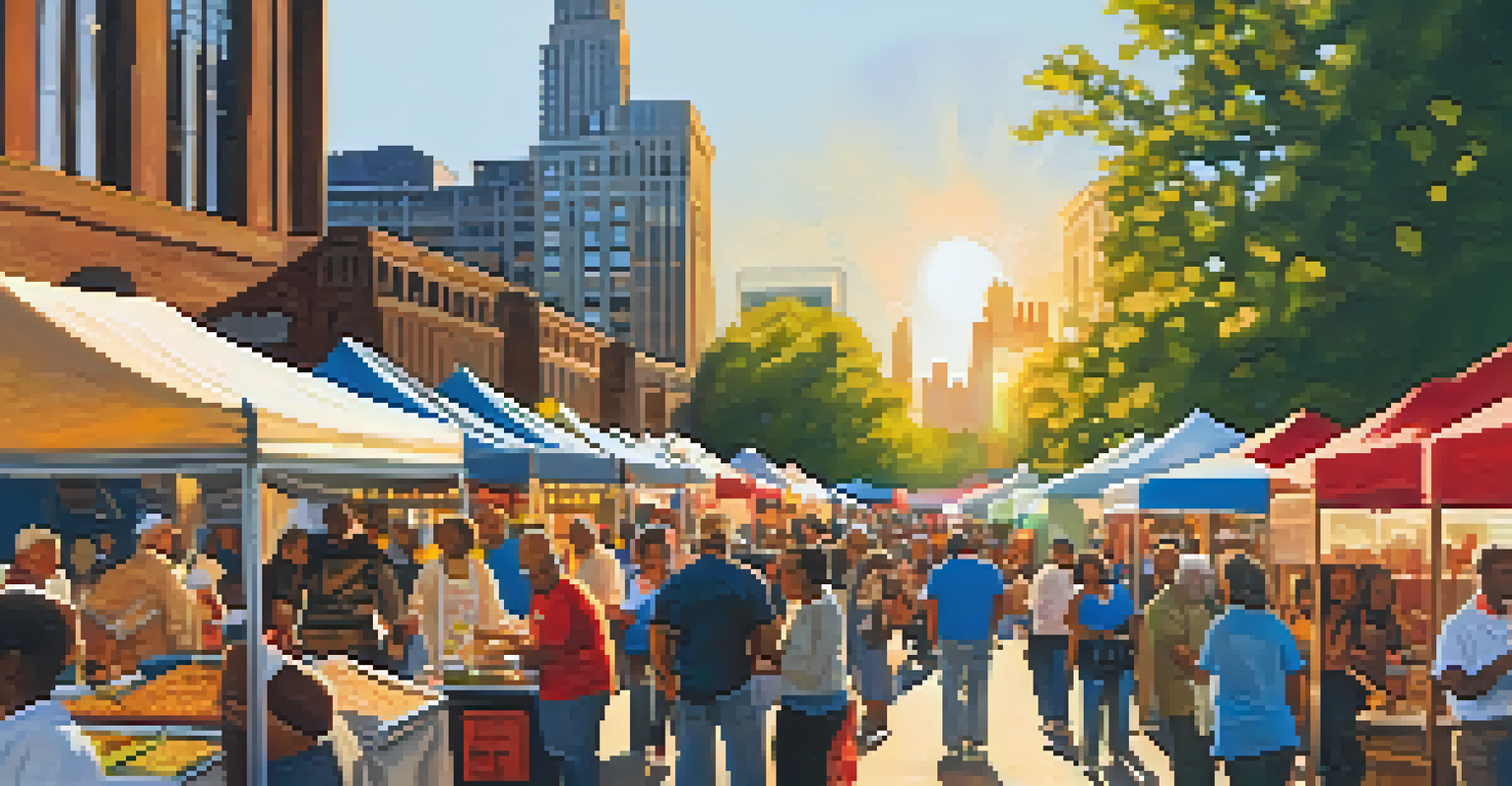The Chicago Blues Festival: Honoring Musical Diversity

The Origins of the Chicago Blues Festival
The Chicago Blues Festival first kicked off in 1984, showcasing the city's vibrant blues scene. This festival was born out of a desire to celebrate the rich heritage of blues music that has roots deeply embedded in Chicago. Over the years, it has become a platform for both legendary artists and emerging talent to share their passion for the genre.
Blues is the teacher, punk is the preacher.
Chicago, often considered the birthplace of modern blues, has produced iconic musicians like Muddy Waters and Howlin' Wolf. The festival serves as a tribute to these pioneers, while also highlighting the diverse influences that have shaped the sound of blues over the decades. It's a melting pot of musical styles, reflecting the city's cultural richness.
As the festival evolved, it began to incorporate various genres that showcase the influence of blues on other musical forms. From rock to jazz and even hip hop, the Chicago Blues Festival embraces the interconnectedness of music, making it a true celebration of diversity.
Showcasing Diverse Talent and Styles
One of the festival's defining features is its commitment to showcasing a diverse range of talent. Each year, the lineup features both renowned artists and local musicians, offering a platform for voices that might otherwise go unheard. This blend creates an exciting atmosphere where attendees can experience the evolution of blues music firsthand.

The festival does not shy away from genre-blending; it embraces artists who infuse blues with elements of funk, soul, and rock. For instance, you might hear a traditional blues guitarist sharing the stage with a contemporary soul singer, illustrating how these genres influence and inspire one another. This cross-pollination of styles keeps the music fresh and engaging.
Celebrating Blues Heritage
The Chicago Blues Festival honors the rich legacy of blues music and its influential artists, serving as a tribute to both legendary figures and emerging talent.
Moreover, the festival often highlights international artists, showcasing how blues has transcended borders. Musicians from around the globe bring their unique interpretations, enriching the festival's offerings and providing a truly global perspective on this American art form.
Community Engagement and Local Impact
The Chicago Blues Festival is more than just a music event; it’s a community gathering that fosters connections among diverse groups. Local businesses, artisans, and food vendors come together, creating a festive atmosphere that reflects the city's spirit. This community engagement strengthens the bonds among attendees and artists alike.
The blues is a natural fact, is something that a musician has to deal with. It’s the way a musician feels about the world.
Additionally, the festival often includes workshops and panel discussions, allowing participants to dive deeper into the history and techniques of blues music. These educational opportunities help cultivate a new generation of musicians and enthusiasts, ensuring the genre’s continuity and relevance in today's culture. It's a nurturing environment for the future of blues.
The economic impact of the festival is also significant, drawing visitors from all over the country. This influx of tourists supports local hospitality, from hotels to restaurants, benefiting the community as a whole. The festival not only celebrates music but also enhances the cultural and economic landscape of Chicago.
The Role of Women in Blues Music
Women have played a crucial yet often overlooked role in the development of blues music. The Chicago Blues Festival actively seeks to highlight female artists, showcasing their contributions to the genre. From legendary performers like Koko Taylor to contemporary stars, the festival honors these women who have shaped the sound and narrative of blues.
By providing a platform for female musicians, the festival challenges stereotypes and encourages a more inclusive music scene. It highlights the importance of representation, reminding audiences that blues is not just a male-dominated genre. This focus on women in blues fosters a sense of empowerment and recognition for their artistry.
Promoting Diversity and Inclusion
The festival actively showcases diverse talent, emphasizing the importance of representation, particularly highlighting the contributions of women in blues music.
Moreover, the festival often features discussions and panels that center around women's experiences in the music industry. These conversations are vital for addressing the challenges they face and celebrating their triumphs, making the festival a supportive space for dialogue and growth.
The Spirit of Collaboration in Blues
Collaboration is at the heart of the Chicago Blues Festival, reflecting the genre's origins in musical partnerships. Whether it’s a jam session or a scheduled performance, artists often come together to create spontaneous, magical moments. This spirit of collaboration not only enriches the festival experience but also showcases the communal nature of blues music.
Each performance is a unique blend of styles and personalities, illustrating the beauty of musical synergy. For instance, a guitarist might team up with a harmonica player and a vocalist, creating an impromptu sound that resonates with the audience. These collaborative efforts invite the audience into the creative process, making them feel like part of the music.
The festival also encourages collaborations across genres, inviting artists from rock, jazz, and even pop to explore the blues. This cross-genre collaboration not only broadens the appeal of blues but also introduces audiences to new sounds and perspectives, further enriching the musical tapestry.
The Festival's Cultural Significance
The Chicago Blues Festival holds significant cultural importance, serving as a reminder of the genre's historical roots in African American communities. It plays a pivotal role in preserving the legacy of blues music while also advocating for its evolution. This cultural significance resonates with audiences, fostering a sense of pride and appreciation for the genre.
Through performances, storytelling, and discussions, the festival highlights the struggles and triumphs of blues musicians throughout history. It serves as a platform for sharing stories that might otherwise be forgotten, ensuring that the rich tapestry of blues culture continues to be woven into the fabric of American music.
Cultural Impact and Community Spirit
Beyond music, the festival fosters community engagement and economic growth, creating a vibrant atmosphere that reflects Chicago's cultural richness.
Moreover, the festival's commitment to inclusivity and diversity reflects broader social movements, making it a beacon of hope and unity. It reminds us that music can transcend barriers and bring people together, reinforcing the idea that blues is a universal language of human experience.
Looking Ahead: The Future of the Chicago Blues Festival
As the Chicago Blues Festival continues to grow, its future looks promising. With a commitment to evolving and embracing new sounds, the festival is poised to remain a vital part of Chicago’s cultural landscape. Organizers are dedicated to ensuring that the festival adapts to the changing musical scene while honoring its roots.
There’s a strong emphasis on engaging younger audiences, who may be less familiar with blues. By incorporating modern elements and collaborating with contemporary artists, the festival aims to attract a new generation of blues lovers. This forward-thinking approach ensures that the spirit of blues will endure for years to come.

Ultimately, the Chicago Blues Festival will continue to celebrate musical diversity, bridging the gap between the past and the future. Its legacy as a gathering place for artists and fans alike solidifies its position as a cornerstone of Chicago’s vibrant music scene.